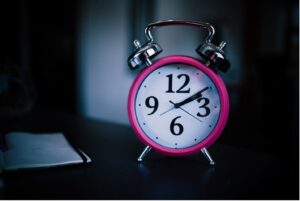It is probably not much of a stretch to say that we have all struggled to get sleep from time to time. Sometimes lack of sleep can be attributed to illness, aches or pains, a lumpy mattress, or insomnia. Other times, it is because it feels like your brain just won’t just shut down, your internal dialogue is keeping you up as you think about your daily stressors, embarrassing things that have happened throughout the day like when your waitress handed you your meal and said ‘enjoy’ and you said, ‘you, too,’ or even more scary or traumatic things that have happened to you throughout your life. Whatever the reason, not being able to sleep tends to be the canary in the coal mine for a lot of people. Meaning, when people don’t get enough sleep, it tends to be a precursor for other physical or mental health symptoms.
 When we sleep, it can feel like we are just shutting down, like everything gets turned off and then we wake up feeling well rested. While a lot of your systems slow down during sleep, the brain is actually active and processing information and data collected throughout the day. Your brain’s activity will vary based on the stage of sleep, but studies are showing that a lot of emotional information is being processed and evaluated during sleep. When you get enough sleep, your brain is able to process this information more fully, whereas not getting enough sleep appears to have negative consequences on your brain’s ability to consolidate positive experiences. The lack of sleep for this process is tied to fluctuations in mood and reactivity, making people who get insufficient sleep more likely to experience negative emotions and have higher levels of reactivity. Insufficient sleep is tied to a variety of mental health disorders, including suicidal thoughts and behaviors. In addition, the lack of sleep can start to feel like a chicken-and-egg scenario, whereby lack of sleep may exacerbate mental health problems and mental health problems may exacerbate one’s lack of sleep. The Sleep Foundation concurs with this bidirectional relationship, noting that sleeping problems may be both the cause and the consequence of mental health problems.
When we sleep, it can feel like we are just shutting down, like everything gets turned off and then we wake up feeling well rested. While a lot of your systems slow down during sleep, the brain is actually active and processing information and data collected throughout the day. Your brain’s activity will vary based on the stage of sleep, but studies are showing that a lot of emotional information is being processed and evaluated during sleep. When you get enough sleep, your brain is able to process this information more fully, whereas not getting enough sleep appears to have negative consequences on your brain’s ability to consolidate positive experiences. The lack of sleep for this process is tied to fluctuations in mood and reactivity, making people who get insufficient sleep more likely to experience negative emotions and have higher levels of reactivity. Insufficient sleep is tied to a variety of mental health disorders, including suicidal thoughts and behaviors. In addition, the lack of sleep can start to feel like a chicken-and-egg scenario, whereby lack of sleep may exacerbate mental health problems and mental health problems may exacerbate one’s lack of sleep. The Sleep Foundation concurs with this bidirectional relationship, noting that sleeping problems may be both the cause and the consequence of mental health problems.
These statistics have been pulled from the Sleep Foundation’s site, describing the connection between sleep and various mental health disorders:
- It is estimated that over 300 million people worldwide have depression, 75% of depressed people show symptoms of insomnia. Plus, depression is associated with feelings of drowsiness/fatigue as well as hypersomnia.
- In America it is estimated that 20% of adults and 25% of teens are impacted by anxiety disorders including generalized anxiety, panic disorder, phobias, and OCD. Anxiety is a hyperarousal of your nervous system. Your brain will not let you sleep if it thinks you are in danger, which is why your mind races at bedtime. This state contributes highly to insomnia. Managing sleep cycles may help to reduce anxiety symptoms.
- There are studies showing a strong connection between PTSD and sleep. At least 90% of U.S. Veterans with combat-related PTSD from recent wars have insomnia symptoms.
- Bipolar disorder is characterized by periods of high highs and low lows. Typically, between the cycles of mania and depression, someone with bipolar disorder will experience periods of time when they require little sleep to periods of time when they sleep excessively. Treatment for insomnia can reduce the impact of bipolar disorder.
- People with schizophrenia are more likely to experience insomnia and circadian rhythm disorders, potentially exacerbated by medication used to treat schizophrenia. Stabilizing sleep may benefit may reduce symptoms of schizophrenia.
- People with ADHD commonly experience difficulty in sleeping. There is evidence of a bidirectional relationship between sleep and ADHD, which suggests that sleep problems may aggravate symptoms like reduced attention span or behavioral problems.
- Autism Spectrum Disorder includes several neurodevelopmental conditions that affect communication and social interaction. Insufficient sleep can contribute to a worsening of symptoms and quality of life for those living with this disorder.
So, how can I get better sleep?
 Hopefully by now you’re realizing that getting enough can greatly impact your mental health. Here are some tips to help you sleep better at night:
Hopefully by now you’re realizing that getting enough can greatly impact your mental health. Here are some tips to help you sleep better at night:
- Avoid drinking caffeine past a certain point- this includes soda! Caffeine will keep you awake.
- Also avoid alcohol, heavy meals, nicotine, and exercise late in the day- these things can dysregulate your system and wake you up.
- Develop a bedtime ritual- Our bodies thrive on routine and we’re easily trainable. Do the same thing every night (take your medication, let the dog out, floss, wash your face, brush your teeth, put on your PJs- you get the gist) to let your brain know it’s time for bed.
- Only use your bed for sleep! Again, we are easily trainable- if you work in bed, watch TV in bed, or just hang out there all day, you are training your brain that bed is a place you need to be alert and oriented instead of calm and restful. Find another spot to watch your TV from or work from your couch or kitchen table instead.
- Practice relaxation techniques before bed- this targets the hyperarousal discussed earlier. Calm your nervous system down by doing deep breathing, progressive muscle relaxation, or listening to a meditation.
- If you are ruminating, you can’t get your thoughts to slow down, practice DBT’s TIP skill. Grab an ice pack or a bowl of ice water and apply it to/submerge your forehead. Basically, you’re activating your dive response, it’s kind of like a reboot for your system. This will help quiet your thinking and decrease rumination.
Good luck and happy sleeping!
About the Author
Maria Mangione (she/her), M.A., LPCC is a licensed clinical counselor that specializes in dialectical behavior therapy. Maria works to help people develop the tools they need to develop trust in themselves and build their life worth living. Maria believes in having meaningful connections with her clients and believes that therapy and healing can be fun. Click Here to learn more about Maria’s experience and therapeutic style.
Additional Reference
Suni, Eric. “Mental Health and Sleep.” Sleep Foundation, OneCare Media Company, 15 Apr. 2022, https://www.sleepfoundation.org/mental-health.

